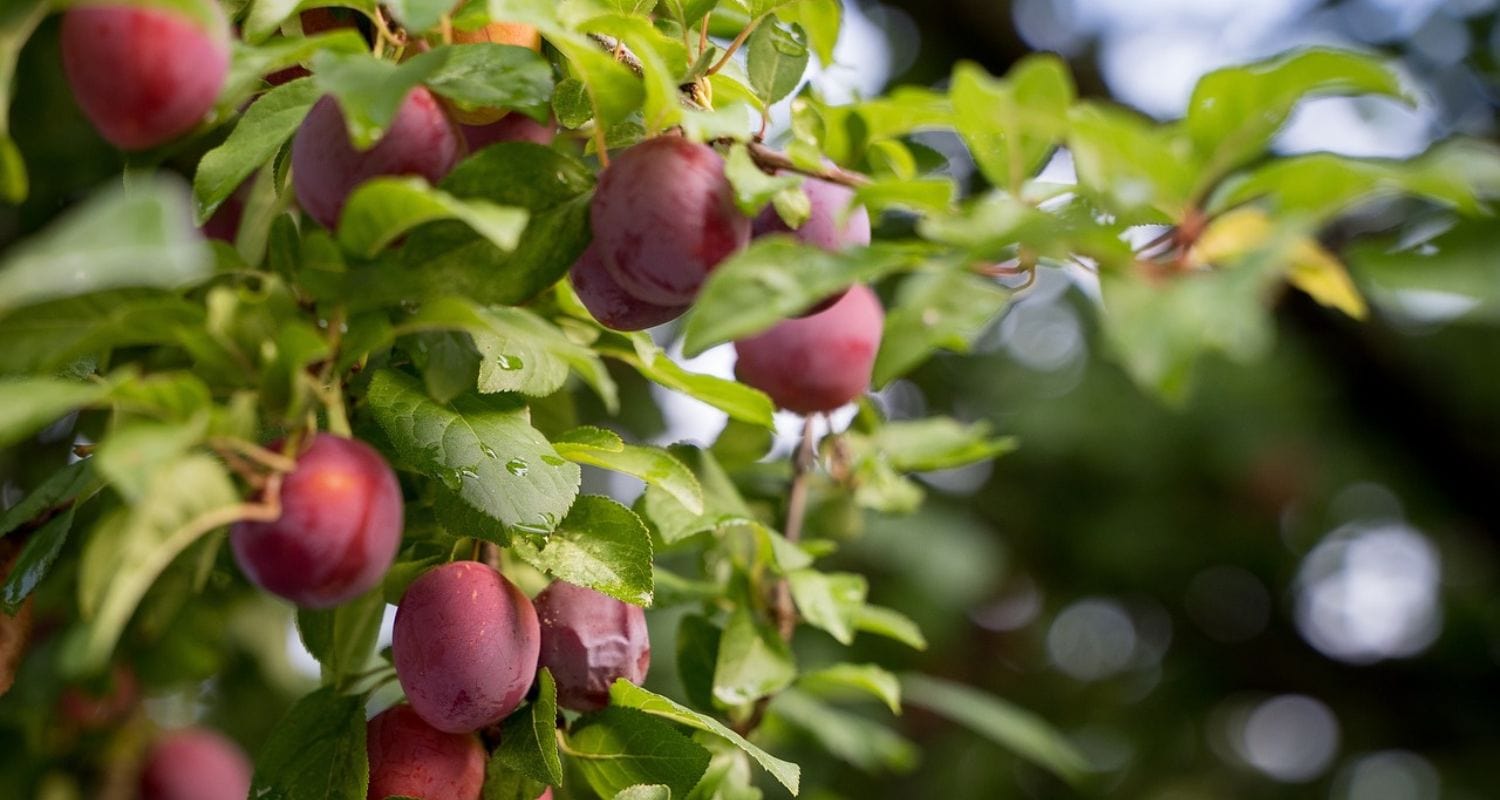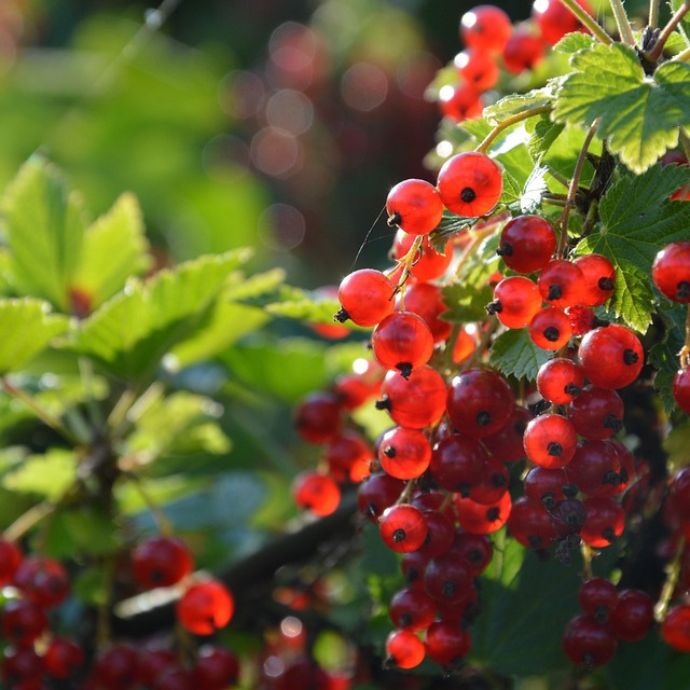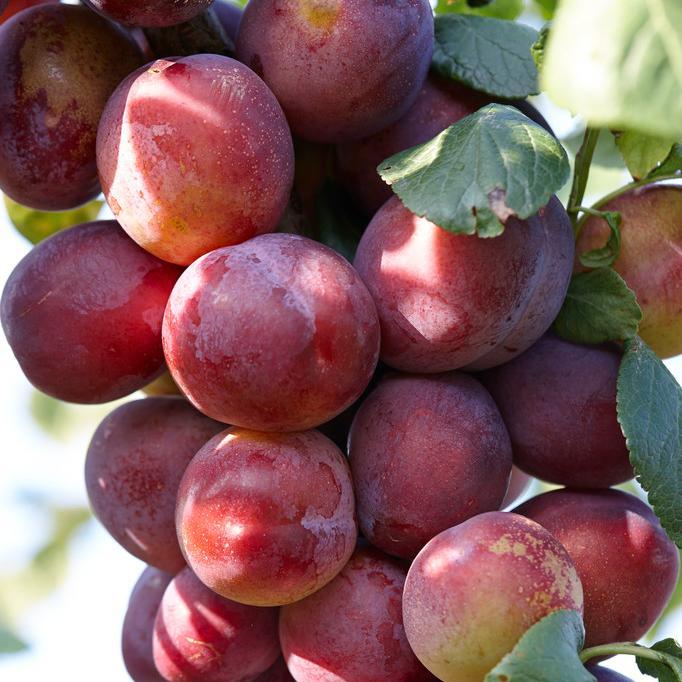Advice & Inspiration
Are Plums Good for You?

Good for you: plums (spoilers). Not good for you: Professor Plum, in the library with the candlestick, if your name just so happens to be Dr Black. These sumptuously sweet, delectable fruits are one of my very favourite drupes (stone fruits) – brilliant both eaten fresh and used in dreamy desserts, the taste of a ripe plum really is hard to beat.
But we wanted to dive a bit deeper and break down just how healthy these fruits really are, including calories, macronutrient profiles and the differences between fresh and dried plums. First, let’s look at the basics.
Jump to:
- Macronutrient breakdown of plums
- Vitamins and minerals in plums
- Calories in plums
- Sugars in plums
- Plum health benefits
- Difference between homegrown and store-bought plums
- Can you be allergic to plums?
- Popular plum recipes
How healthy are plums?
If we look at plums by their component nutritional parts, we see the fruit roughly split as follows: approximately 85-90% water, 10% carbohydrates, 1% protein and less than 1% fat (give or take a percentage point or two). These figures are roughly in alignment with other stone fruits like cherries and apricots.
Plum nutrition
Using figures taken from the USDA, 100g of raw plums (which is roughly one and a bit to two smaller plums) comprises the following vitamins and minerals:
|
Vitamin/mineral |
Amount |
Proportion of RDA |
|
Vitamin A |
17µg (micrograms) |
2.43% (men) 2.83% (women) |
|
Vitamin B6 |
0.029mg (milligrams) |
2.07% (men) 2.41% (women) |
|
Vitamin C |
9.5mg |
23.75% |
|
Vitamin E |
0.26mg |
6.5% (men) 8.67% (women) |
|
Vitamin K |
6.4µg |
Intake depends on weight |
|
Calcium |
6mg |
0.86% |
|
Phosphorous |
16mg |
2.91% |
|
Iron |
0.17mg |
1.95% (men and women over 50) 1.15% (women aged 19 to 49) |
|
Magnesium |
7mg |
2.3% (men) 2.6% (women) |
|
Potassium |
157mg |
4.49% |
|
Copper |
0.057mg |
4.75% |
Plum calories
There are 46 calories in 100g of fresh plums, which is less than in the same quantity of cherries (63) and apricots (48). By comparison, 100g of dried plums (also known as prunes) contains 240 calories. This can be explained by the greater amount of sugar found in prunes (38.1g as opposed to the 9.92g contained within 100g of fresh plums).

Sugars in plums
If you take the sugar quantities listed just above and view them through the context of recommended daily amounts, you’ll see that 100g of fresh plums contains 33% of your daily sugar, while the same quantity of prunes contains 127%. We need sugars to function – carbohydrates are our bodies’ main energy source – and fresh fruit provides a good source of them.
Fact: the existence of ‘good’ and ‘bad’ sugars has long been talked about, but the reality is that there’s little difference between them. The problems stem from the quantity of sugar that’s being consumed, rather than the sugars themselves.

What are the plum health benefits?
Plums have a whole host of benefits, including improved bowel functioning, antioxidative properties, better bone health and more. Delicious and healthy? Say no more…
Bowel functioning
Plums (particularly in prune form) are known for helping with bowel problems like constipation, thanks to the presence of a sugar alcohol called sorbitol, which acts as a natural sort of laxative.

Antioxidants
Plums contain various antioxidants, including anthocyanins and chlorogenic acid, which can help combat the risk of certain diseases, such as cancer, arthritis and diabetes. Antioxidants work by neutralising free radicals – unstable molecules that can cause oxidative stress and damage to the cells of the body.

Bone health
Another positive aspect of plums is their effect on bone health. It’s thought that plums and prunes might be able to help with conditions like osteoporosis, in which the body’s bones become weaker and more prone to breaking. The polyphenols contained within prunes can, to quote a recent Penn State University study, “blunt the inflammatory pathways that lead to bone loss”.

Heart functioning and blood pressure
Keeping the ol’ ticker in fine fettle is something most of us think about from one time to another, and here too plums can play a part. A daily dose of prunes, for instance, can help reduce blood cholesterol, while a glass of plum juice is thought to potentially aid in lowering blood pressure, according to a 2017 study.

Differences between homegrown and store-bought plums
There are a couple of major differences between growing and harvesting your own plums and purchasing them from your local supermarket.
One of the major differences is environmental. Growing a plum tree is far better for the environment than relying on fruit imported from countries like South Africa and Chile, which racks up the air or shipping miles. What’s more, growing your own fruit tree can enhance your garden’s biodiversity and pollinator presence.
Another difference, although a more subjective one, is the taste. We believe homegrown fruit legitimately tastes superior to produce purchased from the shop. Why? They’re fresher and less likely to be bruised or bred and selected for reasons other than their taste (like disease resistance or storage qualities, for instance).

Can you be allergic to plums?
You can be allergic to pretty much anything, and plums are no exception. That doesn’t mean it’s a common allergen, however. In fact, it’s very rare to have a genuine plum allergy. It’s more common to have a birch pollen allergy, which can affect sufferers when they eat foods like plums, apples and nuts (to name just a few).

Popular plum recipes
So, now that you’ve been given the all clear to incorporate more plums into your diet, we’re going to go ahead and give you some delicious (and healthy) recipes to try out. Why not whip up this Austrian plum compote? Or this plum, tomato and coriander salad from Waitrose?
If you’re looking to treat yourself with something a little more decadent (and admittedly, a little less healthy) then this scrummy plum crumble from BBC Good Food is a must-consider. You can, of course, just eat your plums straight from the tree – I don’t blame you, mine rarely even make the trug…

Final thoughts
Plums are a healthy fruit, a delicious fruit and a delightfully easy-to-grow fruit. What more could you ask for? Be sure to check out our plum planting and training guides for more information on how to grow these wonderful trees. Go forth and multiply plant!






















